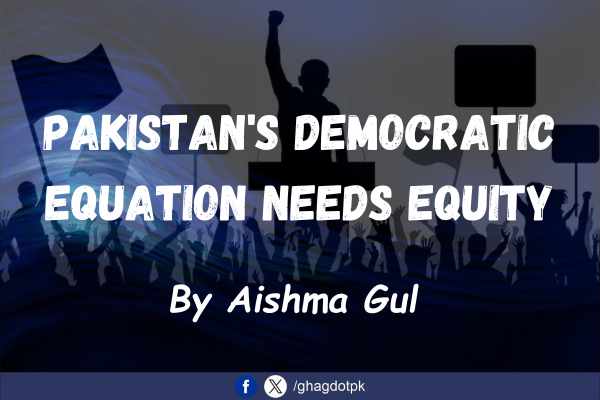By Aishma Gul
International Democracy Day, observed on September 15th, is a United Nations-recognized global celebration promoting democracy, human rights, and democratic governance.
As Pakistan marks this significant day in 2024, its military and security forces are integral to the country’s democratic framework. Christophe Jaffrelot’s ‘The Pakistan Paradox’ notes the Pakistan Army’s professionalism as a factor in democratic stability. Amidst regional challenges, Pakistan’s armed forces navigate the delicate relationship between security and democracy, shaping the nation’s political landscape.
Democracy and Its Importance in Pakistan
Democracy is defined as “government of the people, by the people, for the people,” as Abraham Lincoln so brilliantly put it. Democracy is vital for Pakistan’s stability and progress. Despite significant challenges, Pakistan has upheld democratic principles. The military has played an important role in protecting the state’s sovereignty and the democratic process. International Democracy Day highlights the collaborative efforts needed to safeguard democracy, with Pakistan’s military playing an important role.
Contributions by the Pakistan Army and Security Forces
As Pakistan commemorates International Democracy Day, we underline the critical role of the Pakistan Army and security forces in protecting democratic institutions.
1. Ensuring Election Integrity:
The 2023 general elections were a watershed moment for Pakistan’s democratic advancement. The Pakistan Army deployed 400,000 personnel throughout the country to ensure a calm and transparent process. The Election Commission of Pakistan (ECP) confirmed that no terrorist attacks were recorded on election day. This was a huge accomplishment, especially in areas like Khyber Pakhtunkhwa, where elections have traditionally been marred by violence.
2. Maintaining Law and Order:
Pakistan’s internal security situation has dramatically improved during the last decade. According to a report by the National Counter Terrorism Authority (NACTA), terrorist activities have decreased by 62% between 2014 and 2023, owing primarily to military operations like as Zarb-e-Azb and Radd-ul-Fasaad. These operations have eliminated terrorist networks, notably in tribal areas, allowing democratic institutions to function more freely and securely.
3. Counterterrorism and Border Security:
Pakistan’s strategic location, which shares borders with Afghanistan, India, and Iran, poses considerable security problems. Due to the volatility caused by NATO’s exit in 2021, the western border with Afghanistan has become a focus point. To combat the threat of cross-border militancy, Pakistan’s military built a 2,600-kilometer fence along the Afghan border, which, according to the Ministry of Interior, has significantly reduced illegal infiltration and terrorist activity since 2022. Furthermore, security has been strengthened along Pakistan’s eastern border with India and its southern border with Iran, assuring a comprehensive approach to national security, which is critical to the operation of Pakistan’s democratic institutions.
4. Disaster Response: The Military’s Humanitarian Role
In addition to their security responsibilities, Pakistan’s armed forces have continuously led disaster relief efforts, contributing considerably to national stability. The military spearheaded rescue and relief activities following the devastating earthquake in 2005, which killed over 80,000 people and displaced millions. According to the National Disaster Management Authority (NDMA), almost 30,000 soldiers were sent within hours of the disaster to rescue people, provide medical treatment, and repair critical infrastructure in the devastated areas.
Similarly, during the 2022 floods, which displaced over 33 million people, the Pakistan Army once again played a critical role in providing humanitarian assistance. NDMA reports emphasized the military’s role in evacuating stranded civilians, distributing relief supplies, and restoring infrastructures.
Achievements and Challenges
The Pakistan Army’s role in maintaining democracy has been both comprehensive and challenging. In volatile areas including Khyber Pakhtunkhwa and Balochistan, the military has waged insurgencies that pose substantial dangers to national stability. Despite these hurdles, the armed forces have made significant headway in restoring peace. According to the ISPR, terrorist events have fallen by more than 70% since 2014, bringing much-needed calm to democratic processes.
However, challenges still exist. The insurgencies in certain areas require a delicate balance between military intervention and political dialogue. Nevertheless, the military’s continued efforts to safeguard the country and maintain security have been critical in allowing democratic administration to thrive.
A Long-Term Commitment to Democracy
As Pakistan marks International Democracy Day 2024, the military’s critical role in protecting democratic institutions is highlighted. Pakistan’s military forces have constantly proved their devotion to democratic values by providing steadfast support in the security of elections, reacting to natural calamities, and maintaining national security. Looking ahead, consistent coordination between military and civilian institutions will be vital in consolidating Pakistan’s democratic gains.






